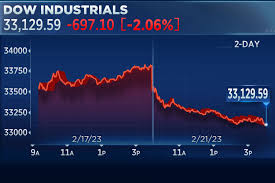Markets may be in a celebratory mood after President Trump’s latest reversal on threatened tariffs against the European Union, but this kind of erratic policymaking is not a sign of economic strength. It’s a growing liability.
That’s the warning from Nigel Green, CEO of global financial advisory giant deVere Group, as European stock index futures gained after Trump said he would extend the deadline for the EU to face higher tariffs.
The bloc had been facing 20% tariffs under the reciprocal rates announced in April, and a temporary pause took the rate down to 10% until July 9.
Futures on the Euro Stoxx 50 rose 1.6% on the development.
“Trump’s flip-flopping on major trade issues is undermining America’s standing as a trusted commercial partner — with long-term consequences that go far beyond short-term market gains,” says Nigel Green.
“Trump blinked — again — and the markets cheered. But this isn’t tactical manoeuvring, it’s inconsistency dressed up as strategy. Allies see it. Rivals see it. Investors should be paying attention.”
This week, Trump backtracked on plans to hit EU car imports with sweeping new tariffs, walking away from a threat that has loomed large for months. It follows a pattern that’s become familiar. Announce harsh trade measures. Stall. Backpedal. Repeat.
Earlier this month, The White House confirmed a deal struck in Geneva that will see US tariffs on Chinese goods drop from 145% to 30%, with China reciprocating by cutting its own duties from 125% to 10%.
Nigel Green continues: “The world’s largest economy is behaving in ways more typical of emerging markets in crisis — not the anchor of global commerce. For businesses trying to plan, that’s a nightmare. For global supply chains, it’s chaos. For long-term investment, it’s a deterrent.
“Each time Trump changes course, the market celebrates like it’s good news. It’s not. It’s just the absence of another self-inflicted wound. Meanwhile, the reputational damage quietly builds.”
The deVere CEO goes on to add: “The message to trading partners is clear: the US cannot be relied upon to stick to its word. Agreements are temporary. Threats are frequent. Policies are dictated not by strategy, but by short-term optics.”
Meanwhile others are moving on. The EU is deepening trade ties with Latin America and Asia. China is cementing influence through the RCEP trade bloc. US allies are signing deals that exclude Washington — not because they want to, but because they have to.
“The world is building a Plan B — a future where the US is too unpredictable to anchor global trade,” says Nigel Green. “That’s a seismic shift.”
This week’s reversal on EU tariffs should be a wake-up call. It’s not a signal that things are back on track. It’s confirmation that America’s trade posture is being rewritten week by week, depending on headlines, polling, and market reaction.
Nigel Green says investors must now factor in a new reality: the US, once the poster child for rules-based global trade, is veering into something dangerously close to transactional nationalism.
“This has implications far beyond the auto industry or bilateral deficits,” he warns. “It’s about whether the world sees the US as a reliable place to do business. Right now, many are beginning to doubt it.”
Foreign direct investment into the US has slowed sharply since 2018, according to data from the Peterson Institute. At the same time, America’s share of new international trade agreements is shrinking. Allies like Japan, Australia, and the UK are strengthening ties elsewhere.
“Trump’s latest EU pivot may have given markets a temporary sugar rush — but the global economy is increasingly moving on without America at the center,” concludes Nigel Green.



The beginning of the end for America…, thanks to DJ tRump!
Comments are closed.